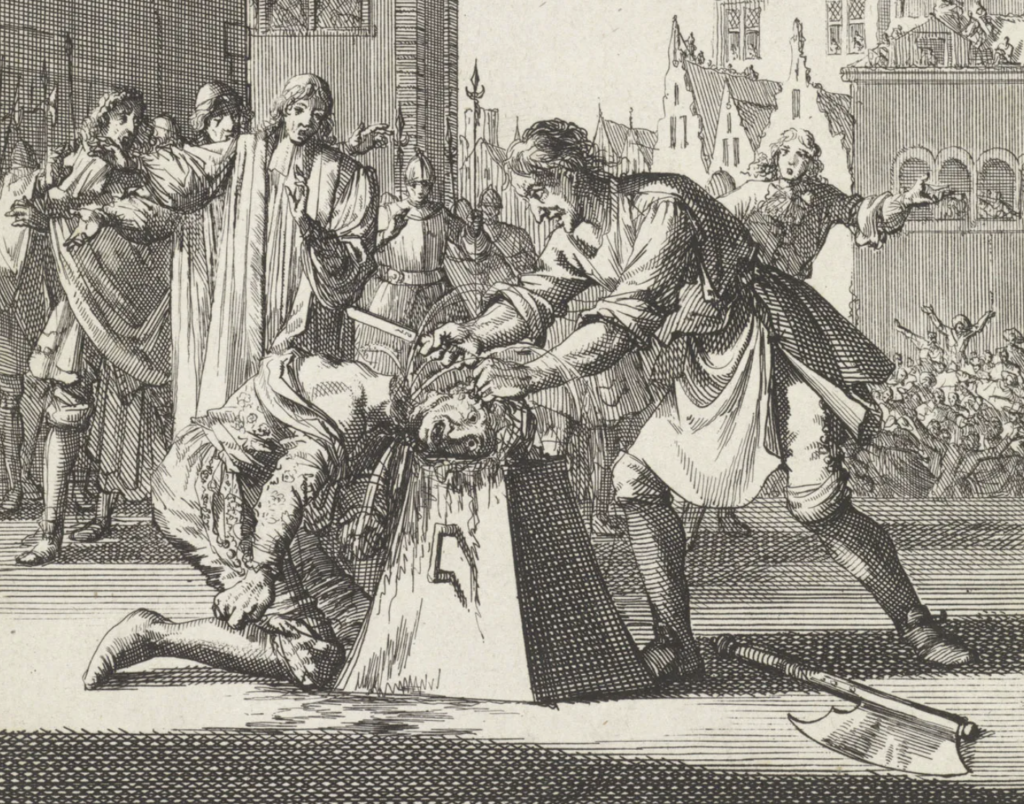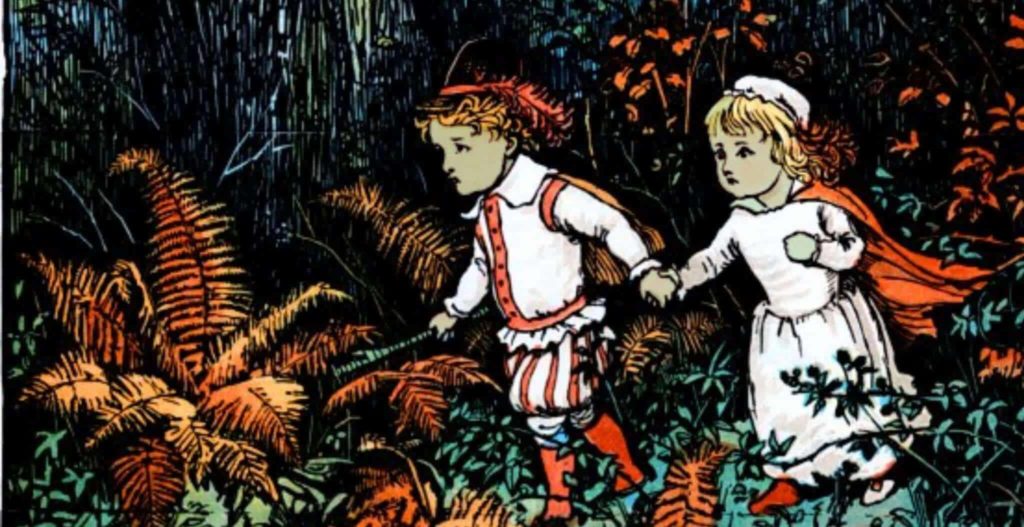Viking mythology, otherwise known as Norse mythology, is a belief system that originated in Scandinavia. Viking is a term that is commonly used to describe the people who are original inhabitants of the Scandinavian countries.
The exact moment of the origination of Viking mythology remains unclear, but it could have begun as early as the Bronze age, which is between 3300 BC to 1200 BC.
Norse mythology was well established during the Viking age, around 793 to 1066 AD. It was the primary religion of Scandinavian countries, which included people originally from Norway, Denmark, and Sweden, at that time.
However, by the end of the Viking age, many Scandinavian countries and their people had been converted to Christianity, resulting in a decline in its practice.
The gods of the Vikings were essential characters in the history and mythos of the Vikings. The Norse gods were legendary, powerful, decisive, domineering, and beautiful.
Some were prideful, compulsive, jealous, and deceitful; some were even perishable. Nevertheless, they had strengths and flaws and dealt with their fair share of adversities.
This article looks at some of the most notable gods of Viking mythology.
Odin
The All-father. Lord of the Aesir. The all-seeing one-eyed god. Odin.
Many religious and mythological pantheons feature one god regarded as the leader or king of all the other gods. In Norse mythology, this god is Odin.
Odin, also known as the “All-father” or father of all, was lord over all the other Viking gods.
He is the most important god in Viking mythology. He is known by over 200 different names and representations in Norse mythology. Odin is known to have taken part in the world’s creation by slaying the primordial being called Ymir and giving life to earth’s first two humans, Ask and Embla.

Odin represents more attributes than any other Viking god. He is associated with divinity, royalty, wisdom, knowledge, sorcery, poetry, war, death, and a host of other concepts. He is also known to possess divine wisdom and a fierce temper.
He rode a flying eight-legged horse called Sleipnir and reigned on his Asgard throne as a supreme god. Odin fathered many sons; most notable among them were the gods Thor and Baldr.
The souls of Viking heroes who bravely die in battle are welcomed by Odin, as his sons, in the Hall of Valhalla.
Thor
Thor, son of Odin and the Norse god of thunder, is perhaps the most popular among the gods of Norse mythology.
Thor was acclaimed as the champion of Asgard, and he is the most fearsome god in battle. He was unrelenting in his fight against evil and was a pillar of strength to Asgard.
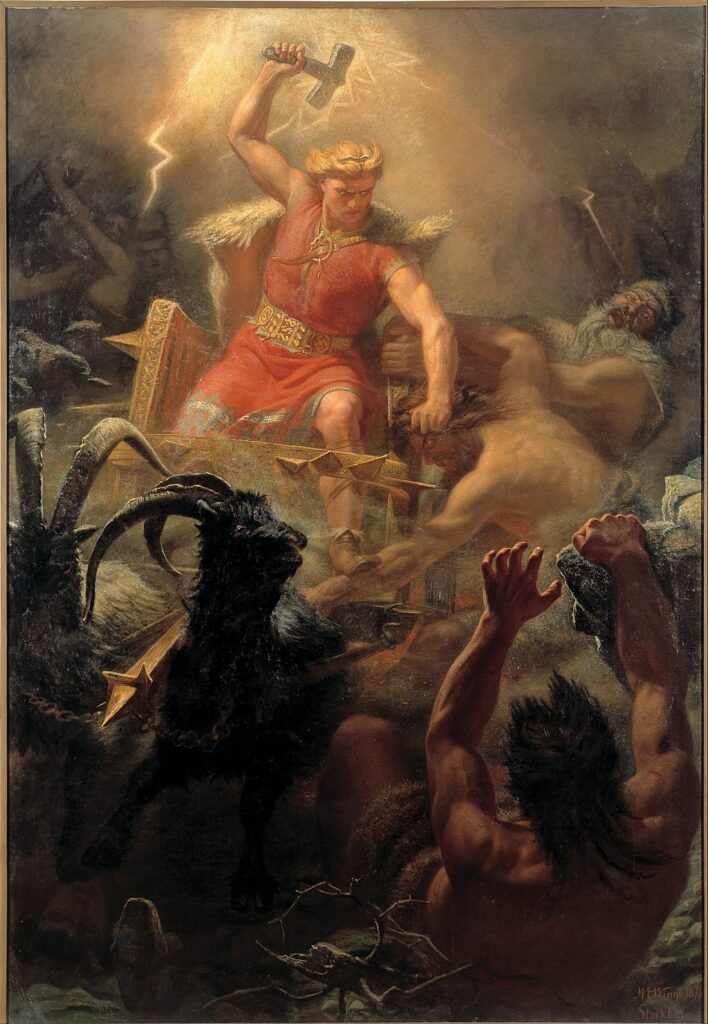
His hammer, Mjölnir, gave him immense strength and had the power to conjure up thunder and lightning bolts. Thor is one of the Norse gods whose legacy has attracted wide-scale commercial appeal, with numerous comic books and cinematic representations of him cherished by millions of fans worldwide.
Loki
Loki is one of the most famous gods in Viking mythology. Loki is the god of mischief and deceit.
Cunning, unpredictable, and mischievous, but also charismatic, charming, and extremely intelligent. Loki had a very complex relationship with the other gods of Asgard because of his evil and treacherous nature. He was a shapeshifter, capable of taking any shape or form he wished, and always loved to be the center of attention.
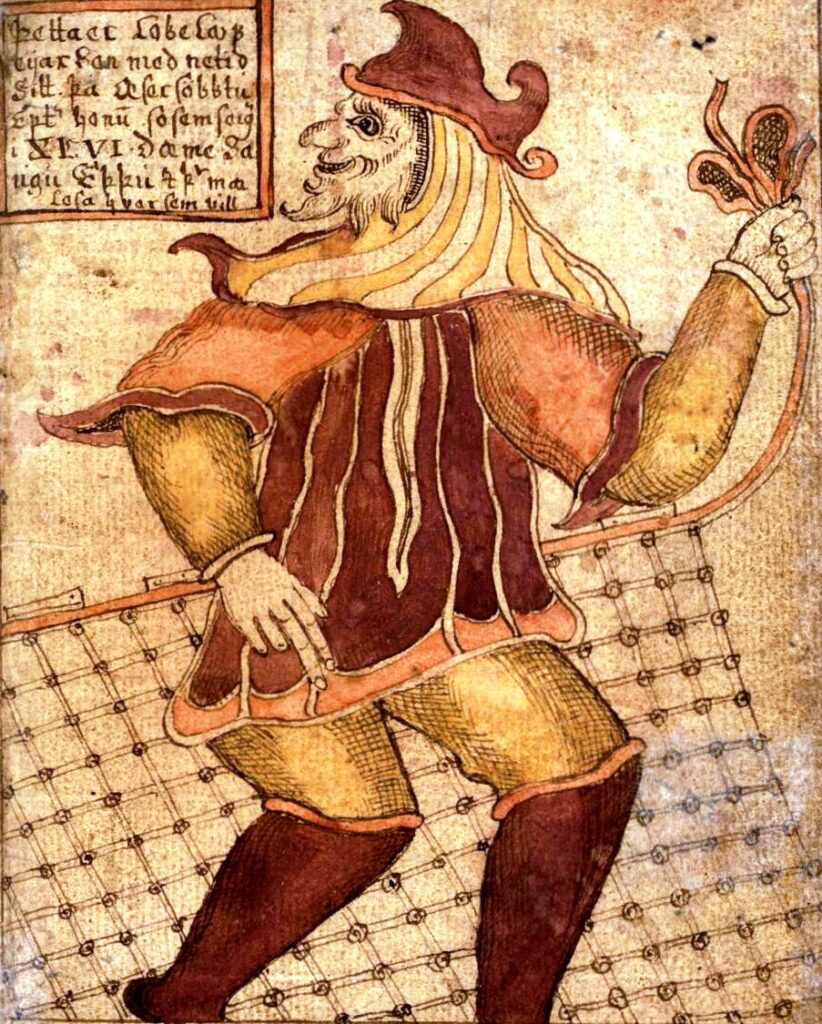
Loki is generally portrayed as the son of the frost giants Fárbauti and Laufey but was adopted by Odin, who liked his wit and charm and brought him to Asgard, where the other gods accepted him. Loki, however, developed a great reputation as a spiteful trickster despised by both the gods and giants.
With his wit and charm, he always found a way to weasel himself into anyone’s good graces.
Loki’s pranks led to the death of Baldur, earning him a severely gruesome punishment. It is said that Loki will be responsible for leading the forces of evil during Ragnarok.
Frigg
Frigg is Odin’s wife and assumes the mother goddess’s role in Viking mythology. She is a central figure among the gods of Asgard and possesses great authority, and is seen as the protector of homes, marriages, and pregnant women. She is also associated with helping women in labor and the birth and naming of children.
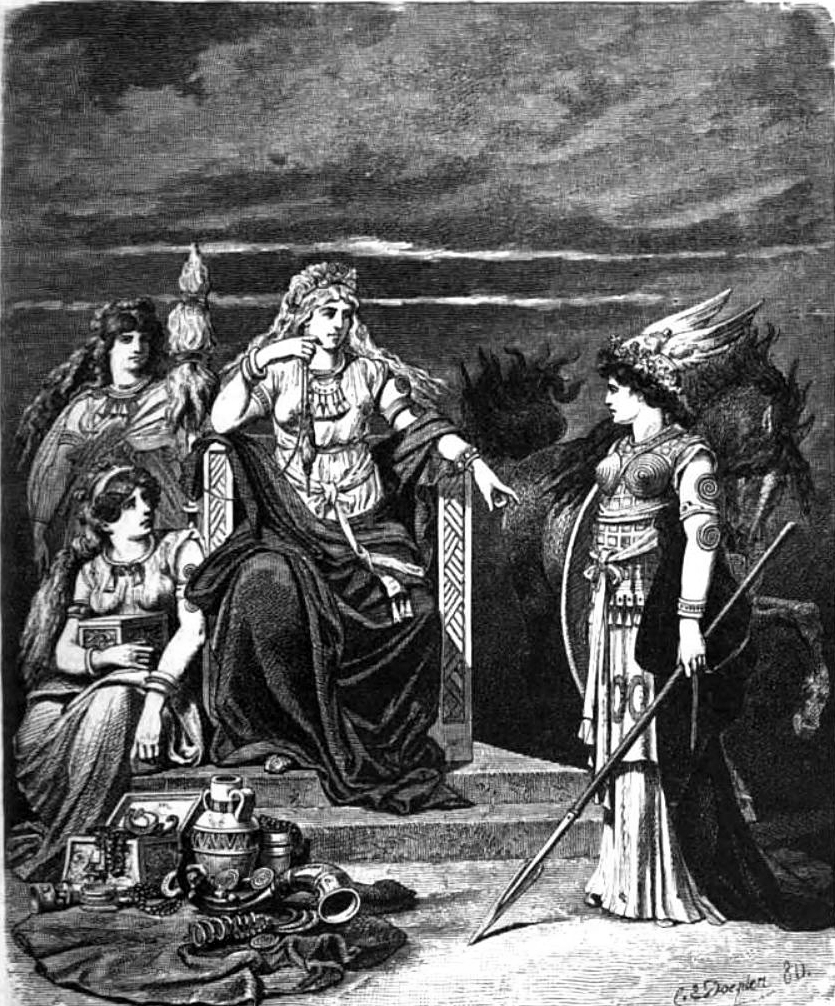
Frigg was a benevolent and peace-making figure who constantly tried to mediate conflicts, making her also regarded as the goddess of peace. Frigg became known as the weeping goddess after Loki’s shenanigans led to the tragic death of her son Baldur.
Many days of the week are said to take their names from the gods of Viking mythology, and Friday is named after Frigg’s honor.
Freyja
This powerful Norse goddess is associated with many things, including love, beauty, sex, fertility, gold, and even war. Freyja was immensely beautiful and capable of charming anyone.
Unfortunately, Freyja had several love relationships with other deities, prompting many clashes between the gods.
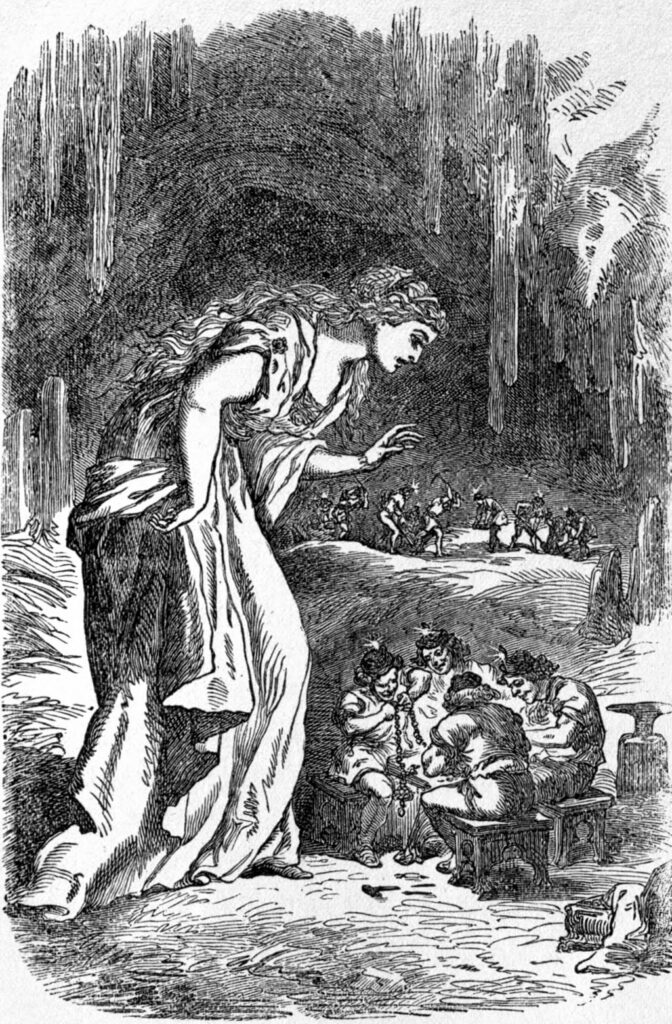
Freyja offered prosperity and fertility to Viking communities and marriages. She is also considered the bride of fallen Viking heroes.
Freyr
Freyr was regarded as the god of prosperity and soil fertility. He had control over the rain and the sun and brought fertility to the land and all sorts of plants and vegetables.
He is the Lord of the Harvest, and Vikings often invoked him to ask for prosperity and a fruitful harvest.
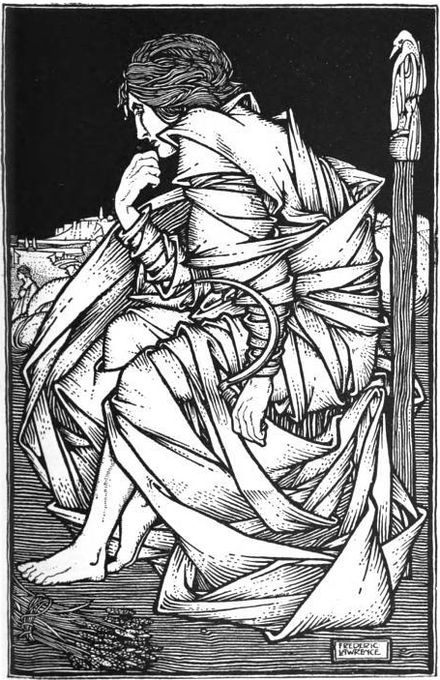
Freyr was also characterized as the protector of true love and was known to possess certain special artifacts.
A sword that could fight by itself without anyone wielding it, a golden boar whose brightness blinded enemies in battle, and a large boat that could be folded and fitted in his pocket.
Baldur
Baldur is one of the noblest of all the gods of Asgard. He is the son of Odin, the father of all the gods in Viking mythology, and Odin’s wife, Frigg.
Baldur is the Norse god of light; he is said to be so fair and bright that light shines from him. Both men and gods adored his peaceful and benign nature.
The death of the kind and benevolent Baldur is one of the most tragic stories from Norse mythology. His mother, Frigg, had a vision of his death and tried to protect him by mandating every creature, plant, element, and metal in the world to swear that they would never hurt Baldur.
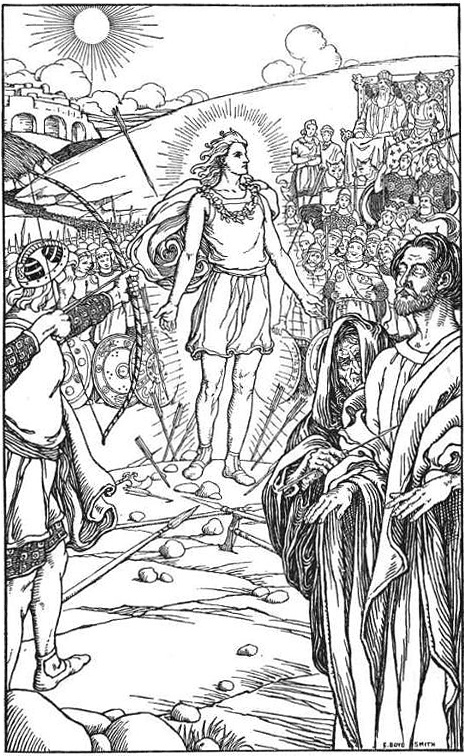
The only thing that escaped this oath was a mistletoe. A plant she deemed too harmless to be of any danger to Baldur.
Baldur was eventually killed due to a devastating bit of trickery from Loki, the trickster god.
Loki had fashioned an arrow out of mistletoe wood and gave it to their brother Hodur, the blind god, who unintentionally killed Baldur with it. His death marks the beginning of Ragnarök, a series of apocalyptic events that destroy the world.
Heimdall
Heimdall is known as the guardian god. The ever-vigilant Heimdall never slept, and his primary role was to defend the Bifröst bridge in Asgard, the stronghold of the Norse gods, from intruders. This bridge was formed by a burning rainbow that connected the kingdom of Asgard with the kingdom of mortal beings.
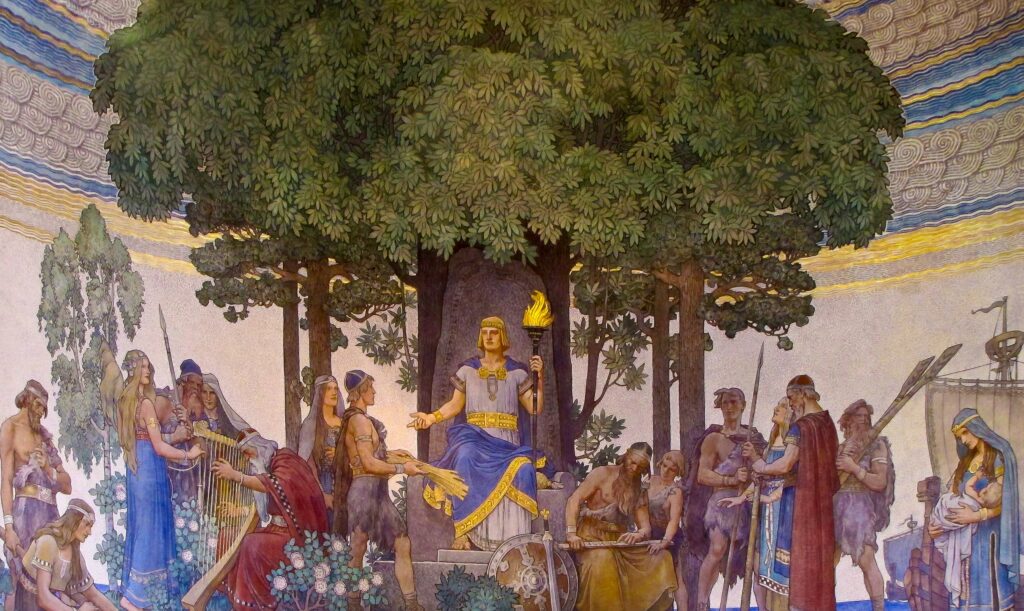
Heimdall has teeth of gold and is renowned for his extraordinary sense of sight and hearing. He could see hundreds of miles ahead during day or night, and his sense of hearing was so acute that he could hear grass and wool on sheep grow.
Heimdall will be the one to announce Ragnarok –the end of the world– by blowing the Gjallarhorn. Heimdall is the son of 9 mothers and is accountable for creating social classes, dividing the Jarls, who were the nobles, the Karls, who were the freemen, and the Træls, who were the servants or enslaved people.
Tyr
Tyr is regarded as the principal god of war in Norse mythology.
One of the bravest and most valiant gods of Viking mythology. He fought many fierce battles alongside the gods in Asgard to keep enemies at bay. Tyr is depicted chiefly with one hand, as he was said to have lost his right hand while battling with the vicious wolf Fenrir that troubled the gods of Asgard.
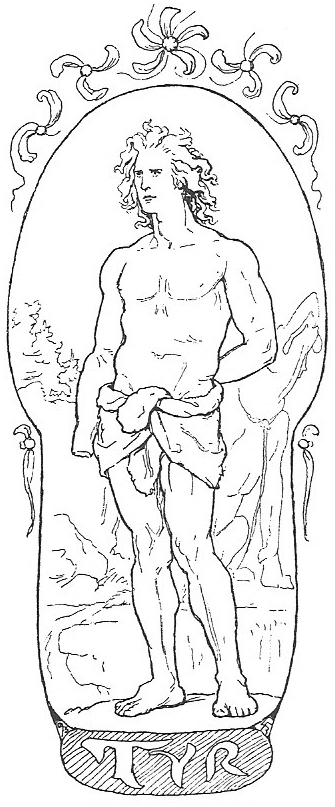
Tyr represents law, wisdom, justice, and fulfillment of oaths. Tyr is often invoked for victory in battle. Viking warriors dedicated their weapons to him, hoping he would bless them and grant them great strength and victory.
Hel
It’s easy to guess what this god is about from her name alone. Like other cultures and mythologies have a guardian of the underworld like Hades in Greek mythology, Hel is the goddess of the cold, dark and misty underworld of Norse mythology, located in Niflheim.
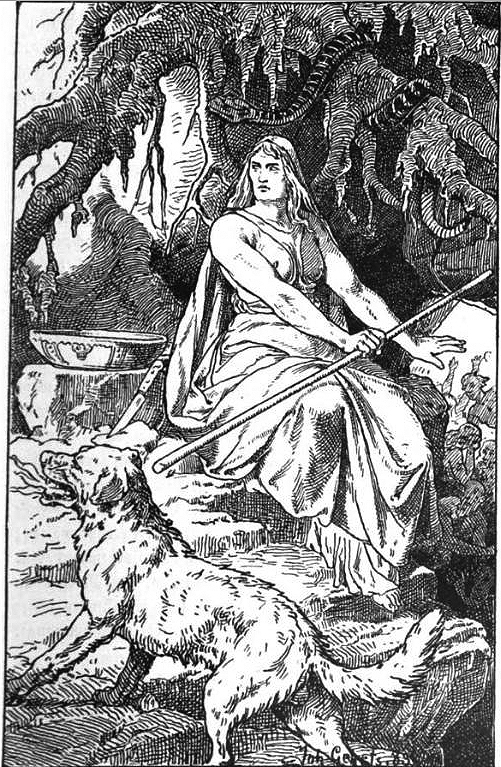
She is also Loki’s daughter and possesses a devious intelligence and charisma similar to her father.
It is said that one half of her is dead and looks mortifying, and the other half is extremely beautiful.
Njord
Njord is a very important god in the Norse pantheon and is associated with battle, the seas, wind, fishing, and wealth. A popular saying among the Vikings about wealth was to say “as rich as Njord.”
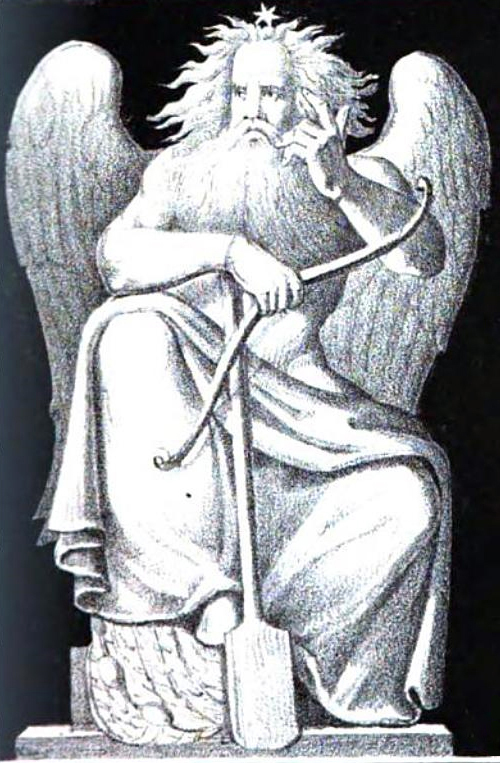
He is one of the most revered gods among the Vikings because the Viking people depend on the seas for their survival. He is the father of the gods Freyr and Freyja.
Vidar
Vidar is the son of Odin and half-brother of Thor. Known as the god of vengeance, he also has the nickname the silent God. Vidar was a fearsome warrior, notable for taking revenge for the death of the All-Father, Odin, by slaying the wolf Fenrir.
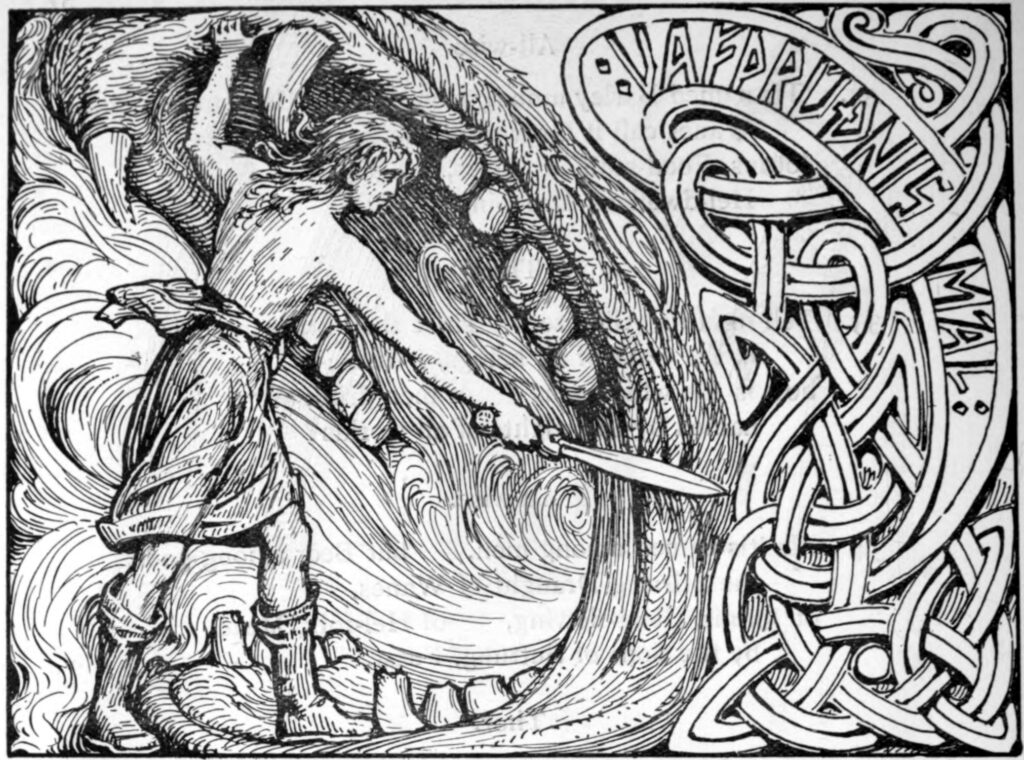
Vidar and Thor are the two cornerstones of the martial might of Asgard. He is second only to Thor regarding physical strength and battle prowess. Vidar is regarded as the god of the forests, silence, and revenge.
Nanna
Nanna is associated with the beauty of the moon and night sky. She is the wife of Baldur, Odin’s son and a goddess of peace and joy. Nanna, however, dies of grief after Loki’s trickery leads to the tragic death of her husband, Baldur.
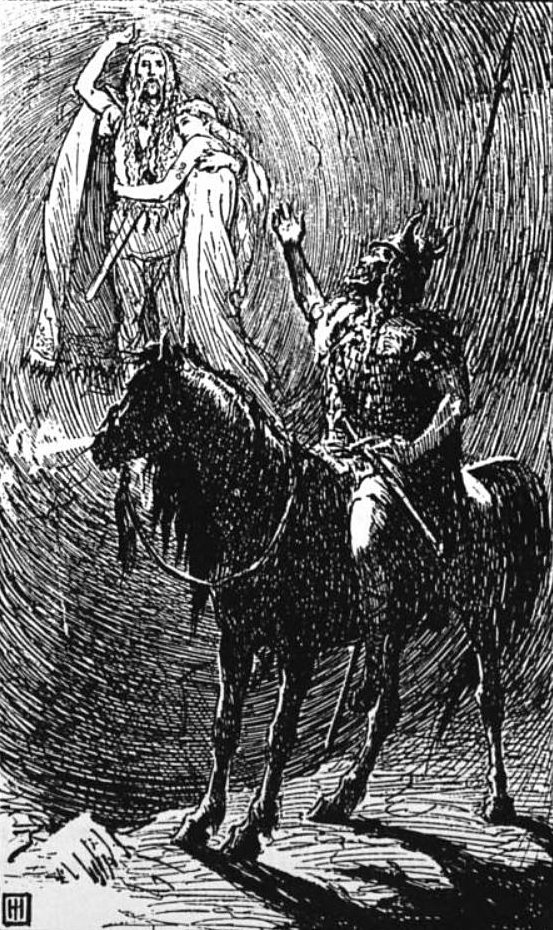
Nanna and Baldur reunite in Hell after their death, which marks Ragnarok’s beginning stages.
Idun
Idun is the goddess of youth and vitality. She was responsible for guarding the golden apples of eternal youthfulness. Her presence in Asgard replenished the gods, as the gods ate these apples to preserve their youth. Without her, the gods will wither, age, and die.
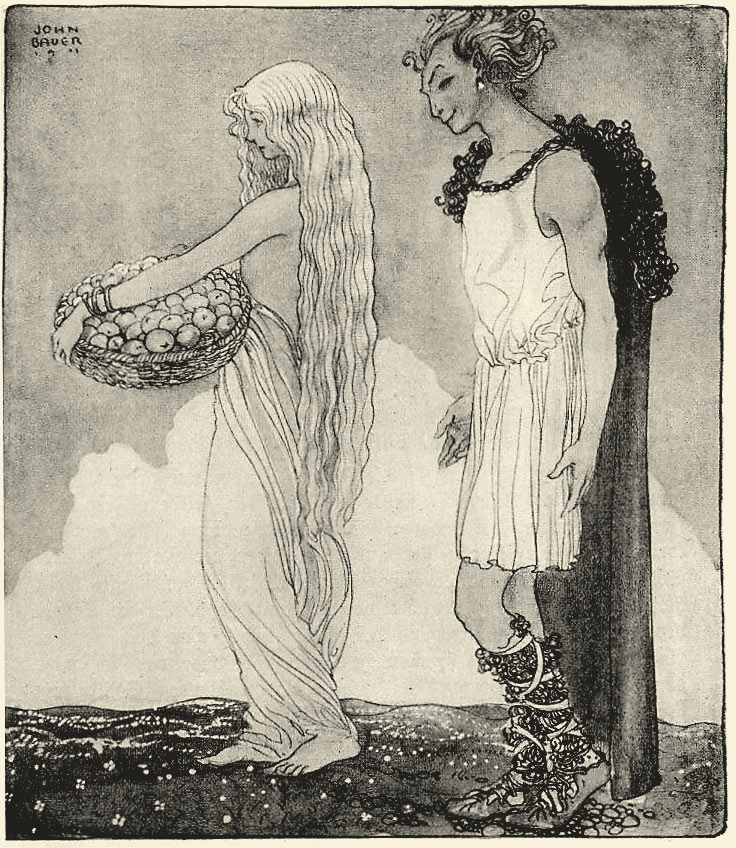
Idun is the wife of Bragi, the god of poetry, and she is associated with fertility and the cycle of death and rebirth.
Bragi
Bragi is the god of poetry and music. A skaldic poet and the patron deity of arts. Bragi was wise and possessed the gift of speech. He was a particularly eloquent storyteller and singer of melodic songs.
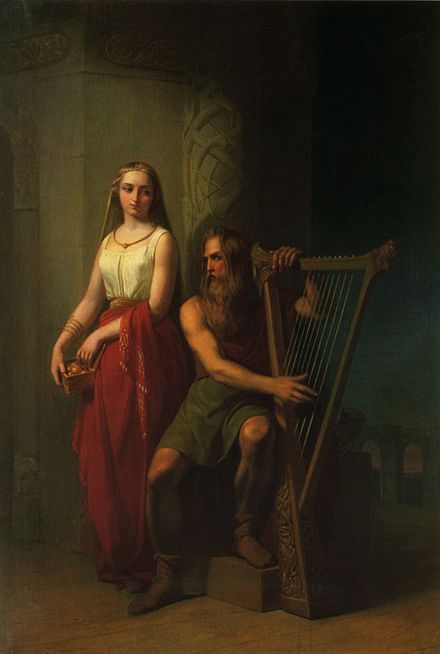
Bragi is renowned for his extraordinary verbal abilities and is also called the long-bearded god.
Sif
Sif is a goddess of legendary beauty and the wife of Thor, the Norse god of Thunder. Her long golden hair is seen as a metaphor for life and harvest.
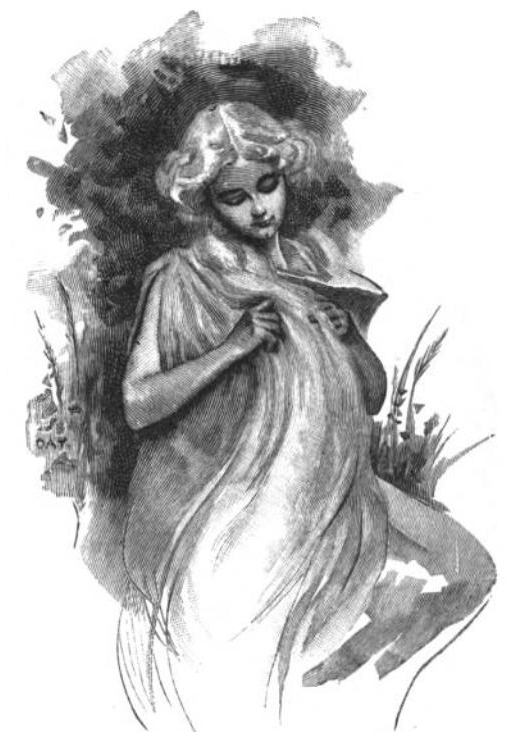
Norse mythology depicts her as a symbol of emotional strength, loyalty, and love. Yet, despite her feminine attributes, she was a fierce and outstanding warrior.
Forseti
Son of Baldur and Nanna, Forseti is the Norse god of justice and reconciliation. He brought reconciliation between gods, mortals, and enemies.
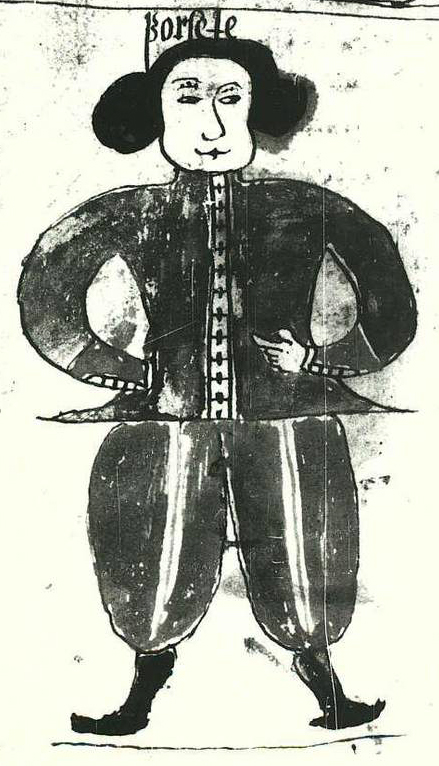
Forseti was considered a bastion of justice and the god of arbitration. This is because he always strives to ensure everything stays in perfect order.
